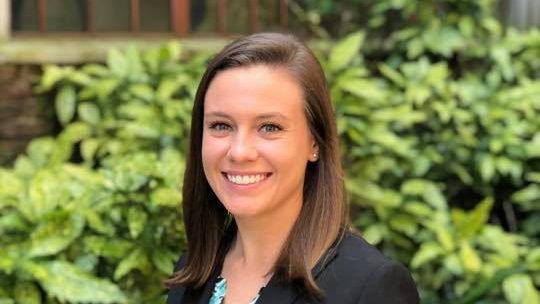
Growing up, Riley Dunnam’s grandparents were in and out of hospitals frequently with health issues. She would sit in the hospital rooms with her grandparents and parents while they talked to doctors or watched the TV in the room. She would watch the nurses, nurses’ aides, and doctors come in and out of the room, all seeming to have their own schedules and tasks while contributing to the greatest task of all – taking care of her family.
From about the time she was 10 years old, Dunnam was fascinated by how the hospital functioned, and she wanted to be a part of it.
However, she didn’t want to be a nurse or a doctor because she didn’t like blood. It wasn’t until her sophomore year of college that she found out that she could be a part of a hospital system without having to be on the clinical side.
Dunnam, now a public health sciences student is working toward pursuing this career. To do this, she is part of the Accelerated Pathways to Medical University of South Carolina Professional Health Degrees program.
She’s combining her senior year and first year of graduate school at MUSC. The accelerated pathway to the Master’s in Health Administration is just one of the pathways Clemson students can choose from.
The program, which began in 2017, offers nine health-related graduate program students can apply to, such as medicine, dentistry, physical therapy and public health, and effectively shave a year off of their studies, said Ronald Gimbel, chair of Clemson’s public health sciences department.
“The accelerated pathways are incredible opportunities for students,” Gimbel said. “Our health systems are in dire need of health care providers, and these programs allow our students to enter the workforce faster without compromising the quality of their education.”
The accelerated program can help students save thousands of dollars in tuition and living expenses, potentially reducing their student debt significantly. Scheduling, jumpstarting careers and less financial pressure the biggest benefits for students interested in this track, said Jami Jones, Chair of the Medical University of South Carolina’s Department of Healthcare Leadership and Management.
“The accelerated track from Clemson to MUSC is a great way for students to achieve a high-quality education and a Master’s degree in Health Administration for less cost,” Jones said.

In the Master’s in Health Administration track, Dunnam said she’s learning about the business and administration side of health care systems and learning how to have patient-centered care while functioning as a hospital. She’s in math classes such as accounting and statistics as well as classes that focus on health care delivery systems, medical terminology, executive skills, insurance processes and how the health system works in America.
“It’s a good mix of business and health care,” Dunnam said.
Outside of classes, she’s gotten the opportunity to audit other classes and help with research projects, such as a project developed by MUSC’s Infection and Prevention Control department that looks at hand-washing hygiene when hospital staff enter and leave a patient’s room. She’s also had the opportunity to learn about the design of hospitals and patient rooms such as the recently opened MUSC Health Shawn Jenkins Children’s Hospital.
“There’s no way to know about what things are like in a hospital until you experience it, and this program has given me that opportunity,” Dunnam said.
She learned about the MHA program through an internship at McLeod Regional Medical Center in Florence. One of her preceptors had an MHA degree from MUSC and conversations about the program piqued her interest in the degree. When she heard about the program, she thought, ‘Wow, this is perfect.’ She wouldn’t have to take too many classes her junior year, so she could graduate early and be on the same timeline she is now. The program allowed for this without reworking her schedule and graduation timeline. But, being in the program has meant more to her then an easier schedule.

“It’s been a great experience, and has helped me grow as a student,” Dunnam said. “Between the projects and presentations, working in teams with other students, and experiencing how a hospital works firsthand, there are so many opportunities to apply what we are learning in class.”
Besides relieving some financial pressure by shaving off a year of graduate school, she said it’s great that she will still be able to get her Clemson degree even though she started graduate school a year early. She’s also getting a jump start in her career. Though her post-graduate plans are not finalized yet, she knows she’s would love to stay in South Carolina.
“I’d love to give back to where I’m from,” Dunnam said. “I’m interested in helping to continue making hospital systems as efficient as possible while providing patient-centered care.”
Get in touch and we will connect you with the author or another expert.
Or email us at news@clemson.edu

